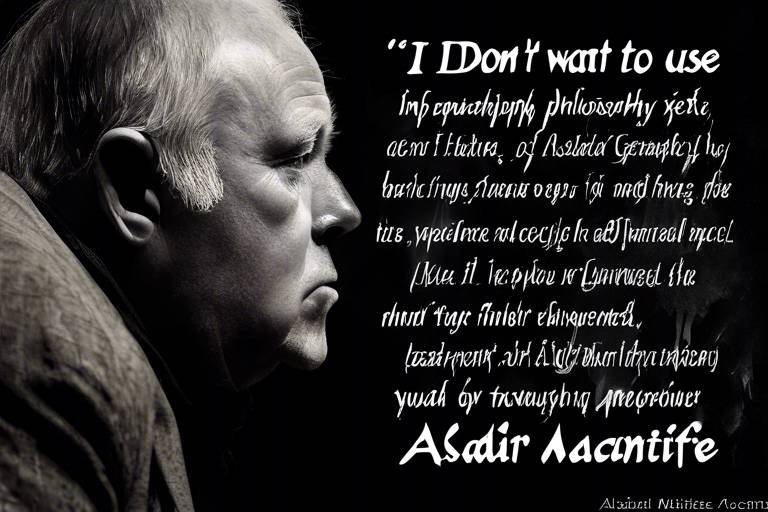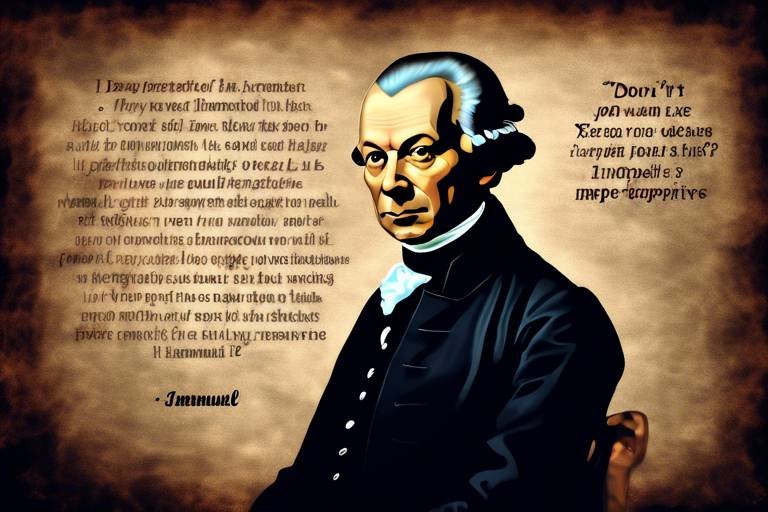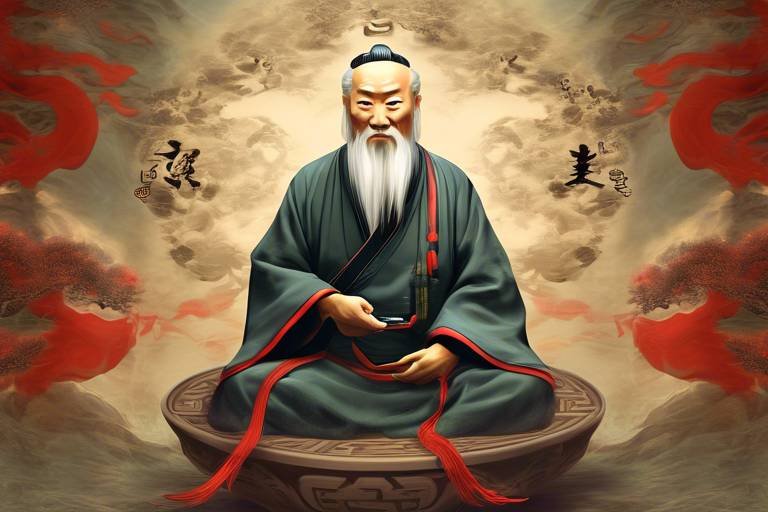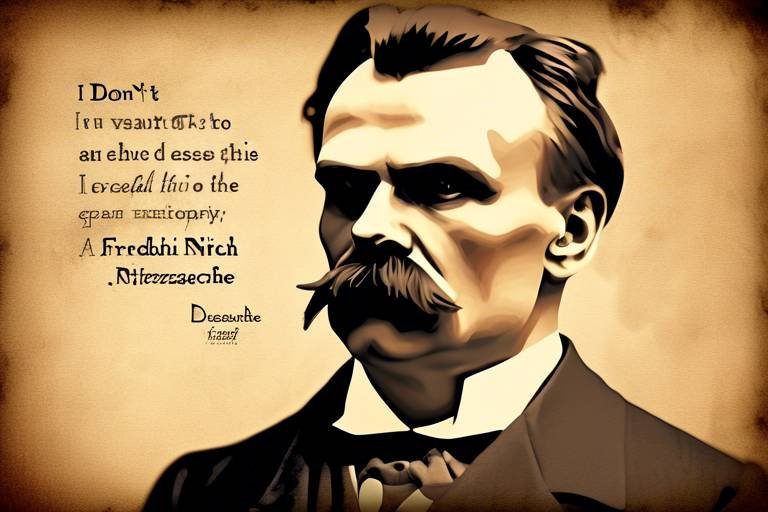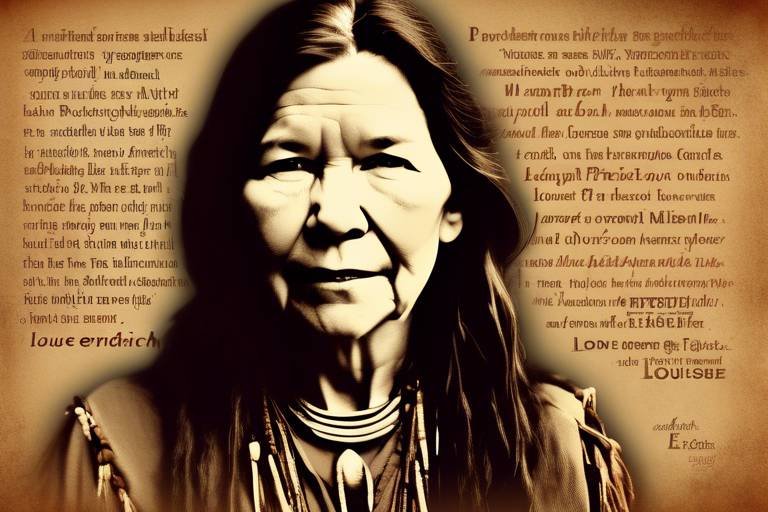The Ethical Philosophy of Alasdair MacIntyre Explored
This article delves into the foundational aspects of Alasdair MacIntyre's ethical philosophy, examining his critiques of modern morality, the importance of virtue, and the role of narrative in ethical understanding. MacIntyre's work is not just an academic exercise; it's a call to rethink how we approach ethics in a world that often feels fragmented and chaotic. His insights challenge us to consider the deeper roots of our moral beliefs and the communities that shape them.
MacIntyre argues that modern moral philosophy has become fragmented and incoherent. He believes that contemporary society suffers from a decline in moral discourse, where ethical discussions often lack depth and direction. This critique is not merely a lamentation; it serves as a wake-up call for us to recognize the implications of this fragmentation. Without a cohesive moral framework, individuals struggle to navigate ethical dilemmas, leading to confusion and inconsistency in moral behavior.
In a world where moral relativism reigns, MacIntyre prompts us to ask: What does it mean to live a good life? His insights reveal the necessity of grounding our moral discussions in shared traditions and communal practices. By examining the historical context of our moral beliefs, we can begin to reconstruct a more coherent ethical framework that resonates with our lived experiences.
Central to MacIntyre's philosophy is the concept of virtue ethics. He posits that virtues are essential for both personal and communal flourishing. In a society that often prioritizes individual rights over collective well-being, MacIntyre urges us to reconsider the importance of character in moral decision-making. Virtues, according to MacIntyre, are not just personal attributes; they are the bedrock of a thriving community.
Imagine virtues as the roots of a tree. The stronger the roots, the more robust the tree. Similarly, a society grounded in shared virtues can weather the storms of ethical dilemmas more effectively. This analogy highlights the need for a return to a virtue-based moral framework, where individuals cultivate their character in harmony with the values of their community.
Understanding the historical development of virtues is crucial. Different cultures and traditions have shaped our understanding of virtues and their role in ethical behavior. For instance, the virtues upheld in Ancient Greece differ significantly from those in Eastern philosophies. These variations illustrate that our moral beliefs are not static; they evolve with the narratives we tell ourselves as a society.
MacIntyre emphasizes that by examining these historical contexts, we can better appreciate the richness of our ethical traditions. This examination allows us to draw from a diverse pool of virtues, enriching our moral frameworks and enhancing our ethical discussions.
Aristotle's philosophy significantly influences MacIntyre's thought. Aristotle emphasized the importance of virtues as habits that enable individuals to achieve their full potential. MacIntyre draws upon this Aristotelian framework to advocate for a return to virtue-based ethics, arguing that modernity has lost sight of the importance of character and community.
Incorporating Aristotelian ethics into contemporary discussions can reinvigorate our approach to morality. It encourages us to focus on what it means to be virtuous rather than merely adhering to a set of rules. This shift in focus can lead to a more meaningful and fulfilling ethical life.
This section explores how MacIntyre's virtue ethics can be applied to modern ethical dilemmas. In today's world, where social media and instant communication often overshadow deep moral reflection, MacIntyre's ideas offer valuable insights. For instance, consider the ethical implications of online behavior. How can we cultivate virtues like empathy and respect in our digital interactions?
By embracing MacIntyre's philosophy, we can foster a sense of social responsibility that extends beyond our immediate circles. This approach encourages us to engage with our communities actively, promoting a culture of ethical awareness and accountability.
MacIntyre emphasizes the importance of narrative in shaping moral identity. Personal stories contribute to our understanding of ethics and the formation of character. Our narratives, whether they stem from family traditions, cultural heritage, or personal experiences, play a pivotal role in how we perceive right and wrong.
Think of your life as a book, with each chapter representing different experiences that shape your moral compass. Just as a well-written story has depth and complexity, so too does our ethical understanding. By reflecting on our narratives, we can gain insights into our values and the virtues we aspire to embody.
MacIntyre advocates for a communitarian approach to ethics, arguing that moral frameworks must be rooted in community traditions. This perspective challenges the dominant individualistic narratives in contemporary society, suggesting that our ethical responsibilities extend beyond ourselves to our communities.
In a world increasingly focused on personal achievement and individual rights, MacIntyre's communitarianism serves as a reminder of the interconnectedness of our moral lives. It prompts us to consider how our actions impact those around us and the importance of fostering a sense of belonging within our communities.
Traditions play a pivotal role in shaping moral beliefs. MacIntyre argues that communal traditions influence ethical perspectives and that preserving these traditions is essential for moral guidance. Without a connection to our past, we risk losing sight of the values that have historically informed our ethical decisions.
By engaging with our traditions, we can cultivate a deeper understanding of our moral responsibilities. This engagement allows us to navigate contemporary ethical dilemmas with a sense of purpose and clarity, drawing upon the wisdom of those who have come before us.
MacIntyre critiques individualism as detrimental to ethical understanding. He highlights the tensions between individual rights and communal values in contemporary moral discourse. In a society that often prioritizes personal freedom, we must ask ourselves: At what cost does this freedom come?
By examining the implications of individualism, we can begin to appreciate the importance of balancing personal autonomy with a commitment to our communities. This balance is crucial for fostering a more cohesive and ethical society.
In this concluding section, we explore the future directions of ethical philosophy based on MacIntyre's insights. As we navigate an increasingly complex world, his ideas can inform ongoing discussions about morality. By returning to virtue ethics and embracing a communitarian approach, we can cultivate a more meaningful ethical discourse that resonates with our shared human experience.
Ultimately, MacIntyre's work challenges us to rethink our ethical frameworks, encouraging us to engage deeply with our communities and the narratives that shape our moral identities. As we move forward, let us carry these insights into our ethical discussions, fostering a culture of virtue and communal responsibility.
- What is Alasdair MacIntyre's main argument? MacIntyre argues for a return to virtue ethics and critiques modern moral philosophy for its fragmentation.
- How does MacIntyre view individualism? He critiques individualism as detrimental to ethical understanding, emphasizing the importance of community values.
- What role do narratives play in ethics according to MacIntyre? Narratives shape our moral identity and provide context for our ethical beliefs and actions.
- Why are traditions important in MacIntyre's philosophy? Traditions provide moral guidance and shape our understanding of virtues, helping us navigate ethical dilemmas.

MacIntyre's Critique of Modernity
Alasdair MacIntyre presents a compelling critique of modernity, arguing that our contemporary moral landscape is marked by a profound fragmentation and incoherence. In his view, the moral discourse that once held society together has deteriorated into a cacophony of competing voices, each claiming legitimacy but often failing to resonate with a shared ethical foundation. This fragmentation is not merely a theoretical concern; it has real-world implications that affect how individuals navigate ethical dilemmas. MacIntyre suggests that the decline of a unified moral framework has led to a situation where moral judgments are often based on subjective preferences rather than objective standards.
One of the key aspects of MacIntyre's critique is his observation that modern moral philosophy has largely abandoned the concept of virtue. Instead of focusing on the character of individuals and the cultivation of good habits, contemporary ethics often emphasizes rules and principles that can be applied universally. This shift, according to MacIntyre, has resulted in a loss of the richness of moral life, where virtues such as courage, honesty, and compassion are sidelined in favor of abstract formulations. He argues that this has led to a moral vacuum, where individuals feel disconnected from the traditions and communities that once provided them with a sense of purpose and belonging.
Furthermore, MacIntyre points out that the rise of individualism has exacerbated this crisis. In a society that prioritizes personal autonomy and self-interest, the communal ties that once bound individuals to one another have weakened. This has created a paradox where, despite living in a highly interconnected world, people often feel isolated in their moral choices. The implications of this trend are profound; as individuals increasingly turn inward, they may struggle to find the guidance they need to make ethical decisions. MacIntyre argues that without a robust moral framework grounded in community traditions, individuals are left adrift, unable to navigate the complexities of modern life.
To illustrate his critique, MacIntyre often references historical examples, highlighting how previous societies maintained a more coherent moral discourse. For instance, in ancient Greece, ethical considerations were deeply intertwined with the community's shared values and practices. The virtues were not just personal attributes; they were essential for the flourishing of the community as a whole. In contrast, modernity tends to view ethics as an individual pursuit, leading to a fragmented understanding of what it means to live a good life.
In conclusion, MacIntyre's critique of modernity serves as a wake-up call for those who seek to understand the ethical challenges of our time. By exposing the limitations of contemporary moral philosophy and advocating for a return to virtue ethics rooted in community traditions, he invites us to reconsider how we approach ethics in an increasingly complex world. The implications of his arguments are not just academic; they resonate with anyone grappling with the moral questions that arise in everyday life.

The Role of Virtue Ethics
Central to Alasdair MacIntyre's philosophy is the concept of virtue ethics, which serves as a cornerstone for understanding moral behavior in both personal and communal contexts. In a world that often prioritizes rules and consequences over character, MacIntyre invites us to reconsider the significance of virtues in shaping our ethical landscape. Virtue ethics transcends mere compliance with laws or societal norms; it emphasizes the importance of developing a moral character that fosters genuine human flourishing.
At its core, virtue ethics is about cultivating qualities that enable individuals to lead fulfilling lives. MacIntyre argues that virtues like courage, honesty, and compassion are not just desirable traits but essential components of a well-lived life. These virtues guide our actions and decisions, helping us navigate the complexities of ethical dilemmas. When we focus on virtues, we shift our attention from the question of "What should I do?" to "What kind of person should I be?" This transformation in perspective is crucial for developing a robust moral identity.
Moreover, MacIntyre emphasizes that virtues are not isolated characteristics; they thrive within a community context. Communities play a vital role in nurturing virtues, as they provide the traditions and narratives that shape our understanding of what it means to be virtuous. For instance, a community that values honesty will encourage its members to practice this virtue in their daily interactions. This communal aspect of virtue ethics fosters a sense of belonging and shared responsibility, reinforcing the idea that ethical living is a collective endeavor.
To illustrate the role of virtues in ethical decision-making, consider the following table that outlines key virtues and their corresponding impacts on personal and communal well-being:
| Virtue | Impact on Personal Well-being | Impact on Communal Well-being |
|---|---|---|
| Courage | Enables individuals to face challenges and take risks. | Encourages a community to stand up for justice and support each other. |
| Honesty | Builds trust and integrity in relationships. | Fosters transparency and accountability within the community. |
| Compassion | Enhances emotional well-being and empathy. | Strengthens social bonds and support systems. |
In addition to these virtues, MacIntyre highlights the importance of practical wisdom or "phronesis," which is the ability to make sound judgments in specific situations. Practical wisdom is developed through experience and reflection, allowing individuals to apply their virtues appropriately. It's this combination of character and wisdom that enables people to navigate the murky waters of ethical dilemmas with grace and integrity.
Ultimately, the role of virtue ethics in MacIntyre's philosophy is to remind us that morality is not just about adhering to rules but about becoming the kind of person who embodies virtues. In a time when ethical discussions often feel fragmented and polarized, returning to a virtue-centered approach can provide a more cohesive framework for understanding our moral obligations to ourselves and to one another.

Historical Context of Virtues
Understanding the historical context of virtues is essential to grasping Alasdair MacIntyre's ethical philosophy. Virtues have not always been perceived in the same way across different cultures and eras. Historically, virtues were often seen as the foundation of a good life, intertwined with the social fabric of communities. In ancient societies, virtues like courage, temperance, and justice were not just personal traits but communal ideals that everyone aspired to embody. These ideals were often codified in religious or philosophical texts, serving as guiding principles for moral behavior.
As we journey through history, we can identify several key periods that have shaped our understanding of virtues:
- Classical Antiquity: In this era, philosophers like Plato and Aristotle laid the groundwork for virtue ethics. Aristotle's concept of the "golden mean" emphasized finding balance in one's character traits, suggesting that virtues lie between extremes.
- Medieval Period: The integration of Christian theology with Aristotelian ethics introduced new virtues, such as faith, hope, and charity, which were seen as essential for moral development.
- Modern Era: Enlightenment thinkers began to shift focus towards individual rights and rationality, often sidelining the communal aspect of virtues. This shift contributed to the fragmentation of moral discourse that MacIntyre critiques.
Each of these periods contributed to a layered understanding of virtues, reflecting the complexities of human character and the societies we inhabit. For instance, the Aristotelian ideal of virtues being cultivated through practice and community engagement starkly contrasts with the modern emphasis on individualism. While individualism celebrates personal autonomy, it often neglects the communal roots of moral understanding, leading to a disconnection from the very traditions that inform ethical behavior.
Moreover, the historical development of virtues illustrates how they are not static; they evolve with cultural shifts and societal needs. For example, in contemporary discussions, we see a resurgence of interest in virtues as responses to modern ethical dilemmas, such as environmental responsibility and social justice. This revival suggests that virtues are not merely relics of the past but are dynamic tools for navigating the complexities of modern life.
In conclusion, the historical context of virtues is a rich tapestry that informs our current ethical landscape. By examining how virtues have been understood and valued across time, we can better appreciate their role in shaping moral character and guiding ethical practices today.
- What are virtues in ethical philosophy? Virtues are character traits that are deemed morally good and are essential for personal and communal flourishing.
- How does MacIntyre view modern morality? MacIntyre critiques modern morality as fragmented and incoherent, arguing that it lacks the communal context that virtues provide.
- Why are historical perspectives on virtues important? Historical perspectives help us understand how virtues have evolved and how they can inform current ethical discussions.

Aristotelian Influence
Alasdair MacIntyre's ethical philosophy is deeply rooted in the traditions of Aristotelian thought. Aristotle, one of the most influential philosophers in history, emphasized the significance of virtue and character in achieving a good life. MacIntyre revitalizes this Aristotelian framework, arguing that modern ethical theories have largely overlooked the importance of virtues in moral decision-making. He critiques the fragmented nature of contemporary moral philosophy, suggesting that without a solid foundation in virtue ethics, our understanding of morality becomes superficial and disconnected.
MacIntyre believes that virtues are not merely personal traits but are essential for fostering a thriving community. Drawing from Aristotle, he posits that virtues are cultivated through social practices and communal life. In his view, virtues like courage, justice, and temperance are not just abstract ideals; they are integral to our interactions and relationships within a community. This perspective challenges the prevalent individualistic approach to ethics, which often prioritizes personal rights over communal responsibilities.
To illustrate the Aristotelian influence on MacIntyre's philosophy, consider the following key aspects:
- Virtue as a Habit: Aristotle described virtues as habits that enable individuals to act according to reason. MacIntyre echoes this sentiment, emphasizing that virtues must be practiced and embedded within our daily lives.
- The Role of Community: For both philosophers, community plays a crucial role in shaping moral character. MacIntyre argues that virtues are cultivated within the context of shared traditions and narratives.
- Teleological Framework: Aristotle's notion of telos—an ultimate purpose or goal—resonates with MacIntyre's belief that ethical behavior should aim toward human flourishing, not merely adherence to rules.
Moreover, MacIntyre's emphasis on narrative is also influenced by Aristotle, who believed that stories have the power to shape our understanding of virtue. By situating moral dilemmas within narratives, MacIntyre argues that we can better comprehend our ethical responsibilities and the virtues we need to cultivate. This narrative approach enriches our moral identity, allowing us to connect our personal stories with the broader communal traditions that inform our values.
In conclusion, the Aristotelian influence on MacIntyre's ethical philosophy is profound and multifaceted. By returning to the roots of virtue ethics, he provides a compelling critique of modern moral frameworks and offers a path toward a more cohesive and meaningful ethical discourse. This return to virtue not only enhances our understanding of morality but also strengthens the bonds within our communities, urging us to act with character and purpose in our everyday lives.

Contemporary Applications
In today's fast-paced world, the relevance of Alasdair MacIntyre's virtue ethics cannot be overstated. As we navigate through various ethical dilemmas, his emphasis on the importance of virtues provides a solid foundation for personal conduct and social responsibility. Imagine a society where decisions are made not merely based on outcomes but on the character of the individuals involved. This shift could lead to a more compassionate and understanding community. MacIntyre's philosophy encourages us to reflect on our actions and the underlying virtues that guide them.
One of the most striking applications of MacIntyre's ideas is in the realm of business ethics. In a corporate landscape often dominated by profit maximization and individualism, incorporating virtue ethics can transform organizational culture. Companies that prioritize virtues such as honesty, integrity, and fairness can cultivate a work environment that fosters trust and collaboration. For instance, organizations can implement ethical training programs that focus on character development, encouraging employees to embody virtues that align with the company’s mission.
Furthermore, MacIntyre's insights can be particularly beneficial in educational settings. By integrating virtue ethics into curricula, educators can help students develop a strong moral compass. This approach not only prepares students to face ethical dilemmas in their personal and professional lives but also instills a sense of community responsibility. Schools that emphasize virtues like respect, empathy, and cooperation can nurture well-rounded individuals who contribute positively to society.
In the context of social justice, MacIntyre’s philosophy provides a framework for understanding the interconnectedness of individual actions and communal well-being. Social movements that advocate for change often rely on narratives that resonate with shared values. By emphasizing virtues, activists can create compelling stories that motivate collective action. For example, movements focused on environmental sustainability can appeal to virtues such as stewardship and responsibility, encouraging individuals to take action for the greater good.
To illustrate the impact of MacIntyre's virtue ethics in contemporary society, consider the following table that outlines various fields and their applications:
| Field | Application of Virtue Ethics |
|---|---|
| Business | Promoting ethical leadership and corporate social responsibility |
| Education | Fostering character development and moral reasoning in students |
| Social Justice | Encouraging collective action based on shared virtues |
| Healthcare | Prioritizing compassion and empathy in patient care |
Ultimately, MacIntyre's virtue ethics serves as a guiding light in our increasingly complex world. It prompts us to ask essential questions: What kind of person do I want to be? How do my actions align with my values? By grounding our ethical decisions in virtues rather than mere rules or consequences, we can create a more cohesive and morally aware society. This approach not only enhances personal integrity but also strengthens community bonds, leading to a more ethical and flourishing world.
- What is virtue ethics? Virtue ethics is an ethical theory that emphasizes the role of character and virtues in moral philosophy rather than rules or consequences.
- How does MacIntyre view modern morality? MacIntyre critiques modern morality as fragmented and incoherent, advocating for a return to virtue-based ethics.
- What are the practical applications of MacIntyre's philosophy? His philosophy can be applied in various fields, including business, education, and social justice, to promote ethical conduct and community responsibility.
- Why is narrative important in ethics? Narrative shapes our moral identity and helps us understand our values and the virtues we aspire to embody.

Narrative and Moral Identity
When we think about our moral identity, it’s not just a collection of rules or principles we follow; it’s deeply intertwined with the stories we tell about ourselves. Alasdair MacIntyre emphasizes that our personal narratives shape who we are and how we understand our ethical responsibilities. Imagine your life as a novel, where each chapter represents a different phase filled with experiences, challenges, and decisions. These chapters help you define your character, not just in the eyes of others but also in your own self-perception.
MacIntyre argues that narratives are essential because they provide context for our actions. Without a narrative framework, our moral choices can feel disjointed or arbitrary. Think of it this way: if you were to make decisions in isolation, without understanding your past or how your actions affect your community, it would be like trying to solve a puzzle without knowing what the final picture looks like. Our stories give coherence and meaning to our lives, allowing us to connect our actions to a broader ethical framework.
Moreover, narratives help us navigate the complexities of moral dilemmas. They allow us to reflect on our experiences and learn from them. For instance, when faced with a difficult decision, recalling past experiences can guide us in choosing a path that aligns with our values. This process of reflection is not merely individual; it can be communal as well. Sharing stories within a community fosters a collective moral identity, reinforcing shared values and responsibilities.
In this sense, narratives are not just personal; they are also social. They bind us to our communities and traditions, grounding our moral identities in a shared history. MacIntyre highlights that the stories we inherit from our communities shape our understanding of virtues and ethical behavior. These narratives can be seen in various forms, such as:
- Family Stories: Tales passed down through generations that instill values and lessons.
- Cultural Narratives: Myths and legends that reflect the moral beliefs of a society.
- Personal Experiences: Individual encounters that shape our understanding of right and wrong.
Ultimately, MacIntyre’s focus on narrative invites us to consider the importance of storytelling in ethical discussions. It challenges us to reflect on our own stories and the stories of those around us. By understanding the narratives that shape our moral identities, we can engage more deeply with the ethical challenges we face today. This approach encourages a richer, more nuanced understanding of morality—one that is not just about rules but about the lived experiences that define us.
1. How does narrative influence our moral choices?
Narratives provide context and meaning to our actions, helping us understand how our choices fit within our personal and communal stories.
2. Can personal narratives change over time?
Absolutely! As we grow and experience new events, our narratives can evolve, leading to shifts in our moral identity and ethical perspectives.
3. Why are communal narratives important?
Communal narratives reinforce shared values and responsibilities, fostering a collective moral identity that guides ethical behavior within a community.
4. What role do stories play in teaching ethics?
Stories serve as powerful tools for teaching ethics by illustrating moral dilemmas and the consequences of different choices, making complex ideas more relatable.

Communitarianism and Ethics
In the realm of ethical philosophy, Alasdair MacIntyre presents a compelling case for communitarianism, emphasizing that our moral frameworks are inextricably linked to the communities we inhabit. He argues that individual moral reasoning cannot be divorced from the traditions and narratives of the communities that shape us. In essence, MacIntyre posits that to understand ethics fully, we must first appreciate the rich tapestry of communal life that informs our moral beliefs.
MacIntyre's advocacy for a communitarian approach challenges the modern tendency toward individualism. In today's society, where personal autonomy is often celebrated, MacIntyre reminds us that our identities are not solely products of individual choices. Rather, they are profoundly influenced by our cultural backgrounds, historical contexts, and the shared values of our communities. This perspective invites us to consider how our ethical decisions resonate within the larger narrative of our communal existence.
To illustrate this point, consider the following aspects of communitarianism:
- Shared Values: Communities often uphold certain values that guide ethical behavior. These shared values create a moral compass that helps individuals navigate complex decisions.
- Tradition: Traditions provide a historical context for moral beliefs, allowing individuals to connect with their heritage and understand the roots of their ethical principles.
- Collective Responsibility: In a communitarian framework, individuals recognize their responsibilities not just to themselves, but to their communities. This fosters a sense of belonging and accountability.
MacIntyre's emphasis on tradition is particularly significant. He argues that ethical beliefs are not static; they evolve within the context of communal narratives. By preserving and engaging with these traditions, communities can cultivate a robust moral framework that guides individual behavior. This approach stands in stark contrast to the fragmented moral landscape of modernity, where ethical principles often appear arbitrary and disconnected.
However, the challenge of individualism looms large. In a culture that often prioritizes personal rights over communal responsibilities, MacIntyre's critique serves as a necessary reminder. He argues that when individuals prioritize their own desires above the welfare of their communities, ethical understanding becomes compromised. This tension between individual rights and communal values raises important questions about the future of ethics in a rapidly changing world.
Ultimately, MacIntyre's communitarianism invites us to reconsider our ethical frameworks. It encourages us to engage with our communities, reflect on our shared histories, and recognize that our moral identities are shaped by the narratives we participate in. By embracing this perspective, we can foster a more cohesive and meaningful ethical discourse that honors both individual and collective experiences.
1. What is communitarianism in ethics?
Communitarianism is an ethical perspective that emphasizes the importance of community and tradition in shaping moral beliefs and values. It argues that individual moral reasoning cannot be separated from the social context in which it exists.
2. How does MacIntyre critique individualism?
MacIntyre critiques individualism by highlighting its detrimental effects on ethical understanding. He argues that prioritizing personal rights over communal responsibilities undermines the moral fabric of society.
3. Why are traditions important in MacIntyre's philosophy?
Traditions are crucial in MacIntyre's philosophy because they provide historical context and shared values that inform ethical behavior. They help individuals connect with their heritage and understand the roots of their moral principles.
4. How can communitarianism be applied to modern ethical dilemmas?
Communitarianism can be applied to modern ethical dilemmas by encouraging individuals to consider the impact of their decisions on their communities. It promotes a sense of collective responsibility and highlights the importance of engaging with communal narratives.

Tradition and Moral Frameworks
Tradition plays a pivotal role in shaping our moral frameworks, acting as a foundation upon which ethical beliefs are built. In Alasdair MacIntyre's view, the traditions we inherit are not just relics of the past; they are living entities that inform our present moral decisions. Imagine a tree, its roots deeply embedded in the soil of history, drawing nutrients from the past to nourish its growth in the present. This analogy illustrates how traditions provide the essential nutrients for our moral lives, shaping our values and guiding our actions.
When we look at various cultures, we see that their moral frameworks are often intertwined with their historical experiences, narratives, and communal practices. For instance, the moral teachings of Confucianism emphasize the importance of familial relationships and social harmony, while Western traditions may stress individual rights and personal freedoms. This diversity highlights the significance of understanding the historical context of a tradition to fully grasp its moral implications. MacIntyre argues that without this contextual understanding, we risk losing the depth and richness that traditions offer.
Moreover, traditions serve as a moral compass, providing a sense of direction in a world that often feels chaotic and fragmented. They help us navigate ethical dilemmas by offering established norms and values that have stood the test of time. However, it's important to note that not all traditions are equally beneficial. Some may perpetuate injustice or inequality, which raises the question: how do we discern which traditions to uphold and which to challenge?
To address this, MacIntyre suggests that we engage critically with our traditions, recognizing their strengths and weaknesses. This process involves a dialogue between the past and the present, allowing us to adapt and refine our moral frameworks in light of contemporary challenges. Just as a craftsman learns from the techniques of their predecessors while innovating new methods, we too can honor our traditions while striving for ethical progress.
In summary, traditions are not static; they are dynamic and responsive to the needs of the communities they serve. By understanding and engaging with our traditions, we can develop a more coherent and meaningful moral framework that resonates with our collective experiences. As we navigate the complexities of modern ethical issues, it is essential to remember that our moral identities are deeply rooted in the traditions we inherit and nurture.
- What is the significance of tradition in ethical philosophy?
Tradition provides a historical context and a moral framework that shapes our values and guides our decisions. - How does MacIntyre view modern moral frameworks?
MacIntyre critiques modern moral philosophy as fragmented and lacking coherence, emphasizing the need for a return to virtue ethics grounded in tradition. - Can traditions be harmful?
Yes, some traditions may perpetuate injustice or inequality, which is why it is essential to engage critically with them. - How can we reconcile tradition with contemporary ethical challenges?
By engaging in a dialogue between the past and present, we can adapt and refine our moral frameworks to address modern issues effectively.

The Challenge of Individualism
In a world that often champions the idea of the individual, Alasdair MacIntyre presents a compelling critique of individualism as it relates to ethical understanding. He argues that the emphasis on personal autonomy and self-interest has led to a fragmented moral landscape, where ethical discourse becomes not only incoherent but also deeply disconnected from the communal traditions that have historically guided human behavior. This is particularly troubling because, as MacIntyre suggests, the fabric of morality is woven from the threads of community, shared narratives, and collective values.
When we prioritize individual rights over communal responsibilities, we risk losing sight of the very foundations that support our ethical frameworks. MacIntyre's perspective invites us to consider how individualism can erode the sense of belonging and mutual obligation that is essential for a flourishing society. He posits that moral understanding cannot thrive in isolation; it requires a context that is often provided by our communities. This raises a crucial question: can we truly understand morality if we detach it from the traditions and narratives that shape our identities?
Moreover, the challenge of individualism is not merely an academic concern; it has real-world implications. For instance, consider the following points:
- Fragmentation of Moral Values: Individualism leads to a situation where personal beliefs can vary widely, resulting in a lack of consensus on ethical issues.
- Undermining of Collective Action: When individuals prioritize their own interests, it becomes increasingly difficult to mobilize communities for common causes, such as social justice or environmental sustainability.
- Isolation and Loneliness: A strong focus on individualism can foster a sense of isolation, as people may feel disconnected from their communities and the shared narratives that bind them.
MacIntyre's critique serves as a reminder that while individual rights are important, they must be balanced with a sense of responsibility to the community. He advocates for a return to a more communitarian approach, where ethical frameworks are rooted in shared traditions and collective values. This shift is not just theoretical; it calls for a practical re-evaluation of how we engage with one another in our personal lives and within society at large.
Ultimately, the challenge of individualism invites us to reflect on our own ethical beliefs and the role of community in shaping them. Are we willing to embrace a more interconnected understanding of morality, one that recognizes the importance of tradition and communal narratives? By doing so, we may find a richer, more meaningful approach to ethics that honors both the individual and the collective.
- What is MacIntyre's main critique of individualism? MacIntyre argues that individualism undermines communal values and leads to a fragmented moral landscape.
- How does individualism affect ethical decision-making? Individualism can result in ethical decisions that prioritize personal interests over communal responsibilities, leading to a lack of cohesion in moral discourse.
- What is the significance of community in MacIntyre's philosophy? Community provides the context and traditions necessary for a coherent understanding of morality, which individualism often neglects.

The Future of Ethical Philosophy
As we stand on the brink of an increasingly complex world, the future of ethical philosophy beckons us to reconsider our moral frameworks through the lens of Alasdair MacIntyre's insights. His critiques of modernity and individualism challenge us to rethink how we engage with ethical dilemmas in our daily lives. The evolution of technology, globalization, and social media has dramatically reshaped our interactions, making it imperative to ground our ethical discussions in a more communal context. MacIntyre's emphasis on tradition and virtue ethics offers a refreshing perspective that could guide us through these turbulent waters.
One of the most significant implications of MacIntyre's philosophy is the call for a return to virtue ethics. In a world where moral relativism often reigns, the focus on character and community can provide a stable foundation for ethical behavior. By fostering virtues such as honesty, courage, and compassion, individuals can cultivate a moral compass that not only benefits themselves but also strengthens their communities. This communal approach could potentially bridge the growing divides in our society, allowing for more constructive dialogues about morality.
Moreover, the role of narrative in shaping our moral identities is becoming increasingly relevant. In an age where personal stories are shared widely across platforms, understanding how our narratives influence our ethical beliefs is crucial. MacIntyre's assertion that we are shaped by our stories invites us to reflect on the narratives we embrace and perpetuate. As we craft our own stories, we must consider how they align with the virtues we wish to embody and the communities we aspire to nurture.
Looking ahead, the challenge lies in integrating MacIntyre's ideas into contemporary ethical discussions. This requires a concerted effort to engage with the traditions that inform our moral beliefs while also being open to new perspectives. Educational institutions, policymakers, and community leaders can play pivotal roles in this integration. By promoting discussions that prioritize virtue ethics and communal values, we can create a more cohesive moral landscape.
In conclusion, the future of ethical philosophy, as envisioned through the lens of Alasdair MacIntyre, is one that values community, tradition, and virtue. As we navigate the complexities of modern life, embracing these elements can lead to a richer, more meaningful ethical discourse. The path forward is not merely about individual rights but about recognizing our interconnectedness and the responsibilities that come with it.
- What is Alasdair MacIntyre's main critique of modern morality? MacIntyre argues that modern moral philosophy has become fragmented and lacks coherence, leading to a decline in meaningful moral discourse.
- How does virtue ethics play a role in MacIntyre's philosophy? Virtue ethics emphasizes the importance of character and communal flourishing, suggesting that virtues are essential for ethical decision-making.
- Why is narrative important in ethical understanding? MacIntyre believes that personal stories shape our moral identities, influencing how we understand and engage with ethics.
- What does MacIntyre mean by communitarianism? Communitarianism advocates for moral frameworks rooted in community traditions, emphasizing the importance of collective responsibility over individualism.
- How can MacIntyre's ideas inform contemporary ethical dilemmas? His emphasis on virtue ethics and community can provide guidance for addressing modern ethical challenges by fostering dialogue and understanding.
Frequently Asked Questions
- What is Alasdair MacIntyre's main critique of modern moral philosophy?
MacIntyre argues that modern moral philosophy has become fragmented and lacks coherence. He believes that this fragmentation leads to a decline in meaningful moral discourse, making it challenging for individuals and societies to engage in ethical practices effectively.
- How does MacIntyre define virtue ethics?
For MacIntyre, virtue ethics is centered around the idea that virtues are essential for both personal and communal flourishing. He emphasizes that character plays a crucial role in moral decision-making, suggesting that cultivating virtues leads to a more fulfilling and ethical life.
- What role does narrative play in MacIntyre's ethical philosophy?
Narrative is key in shaping our moral identity according to MacIntyre. He posits that our personal stories and the narratives we engage with help us understand ethics and contribute to the formation of our character, making our moral choices more meaningful.
- How does MacIntyre's philosophy relate to communitarianism?
MacIntyre advocates for a communitarian approach to ethics, arguing that moral frameworks should be rooted in community traditions. He believes that these traditions provide essential guidance for individual and collective moral responsibilities, countering the isolating tendencies of individualism.
- What is the significance of tradition in MacIntyre's ethical framework?
Tradition plays a pivotal role in shaping moral beliefs in MacIntyre's view. He argues that communal traditions influence our ethical perspectives and that preserving these traditions is vital for providing moral guidance in an increasingly complex world.
- What challenges does individualism pose to ethical understanding?
MacIntyre critiques individualism as detrimental to ethical understanding, highlighting the tensions that arise between individual rights and communal values. He believes that this conflict can lead to a weakened moral discourse and a disconnection from the community's ethical narratives.
- How can MacIntyre's ideas inform future discussions about morality?
MacIntyre's insights encourage a return to virtue-based moral frameworks and emphasize the importance of community traditions in ethical discussions. His philosophy invites us to consider how we can navigate moral complexities in a way that fosters both individual growth and communal well-being.

